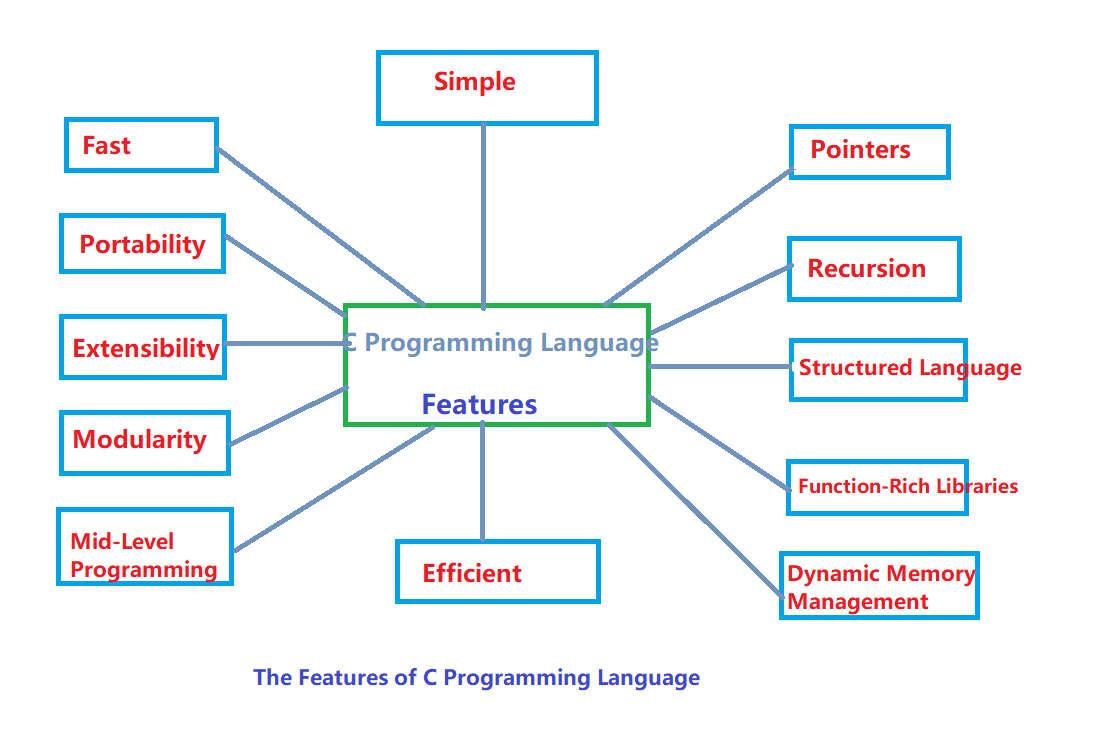
C language is a widely used language that provides many features, including:
- Simplicity: C language is relatively easy to learn compared to other programming languages. C language is a simple language that provides structured approach (breaking down problems into parts), rich library functions, data types, etc.
- Machine independence or portability: C language can be written on different computer platforms without needing extensive modification. Unlike assembly language, C language programs can be executed on many machines with only slight or no modifications.
- Mid-level programming language: C language has both high-level and low-level language features. C language is also used for low-level programming. It is used to develop system applications such as kernels, device drivers, etc. Of course, it also supports the features of high-level languages. That’s why it is called an intermediate-level language.
- Structured programming language: C language is a structured programming language, and we can use functions to break the program into parts. Therefore, C programs are easy to understand and modify.
- Rich program library:
C language has a rich standard library and third-party libraries, which can complete many common programming tasks.
C language provides many built-in functions, and using these ready-made libraries and functions can speed up development. The powerful C libraries and functions can help beginners code easily.
The more data types there are, the stronger the data expression capability. C language has various data types of modern languages, such as character types, integer types, floating-point types, arrays, pointers, structures, and unions, etc. These data types can be used to implement various complex data structures like linked lists, stacks, queues, trees, etc.
Among them, pointers are a very important concept in C language, which can make parameter passing simple and fast, and also save memory.
6. Memory management:
C language requires manual memory management, allowing programmers to have better control over memory usage. It supports the feature of dynamic memory allocation. In C language, we can release the allocated memory at any time by calling the free() function.
7.Fast speed: Programs written in C language execute very fast because the C code can be compiled into machine code and executed directly.
C language has fast compilation and execution time. As an intermediate-level language, C language provides programmers with direct access to computer hardware. C language allows direct access to physical addresses, can perform bit-level operations, and can achieve most of the functions of assembly language. Compared to dynamic-type programming languages, statically-typed programming languages like C are generally faster.
The efficiency of the target code generated from C source programs is only 10% to 20% lower than that written in assembly language. This means that C language can fully utilize the efficiency of the computer.
8. Pointers: Pointers are an important concept in C language, allowing programmers to better handle memory and data structures. We can interact directly with memory by using pointers in C language. Pointers can also be used with memory, structures, functions, arrays, etc.
9. Recursion: In C language, we can call functions within a function. It provides code reusability for each functionality..
10. Extension: C language is extensible as it can easily adopt new features. Programs written in C language can be extended, which means when a program is already written in C language, more functionalities and operations can be added.
11. Modularity: Modularity in C language refers to the ability to break down a program into smaller, independent parts, known as modules. These modules can be written separately, compiled independently, and then linked together to create a complete program.
This modularity provides many benefits such as code reusability, ease of maintenance, and easy collaboration among developers. For example, different modules of a program can be developed by different programmers simultaneously, and then combined to form a complete program.
In C language, modularity is achieved through the use of functions, which can be used to break down the program into smaller, more manageable parts. Each function can perform a specific task, and can be called by other functions as needed, providing a highly modular and flexible structure for programming.